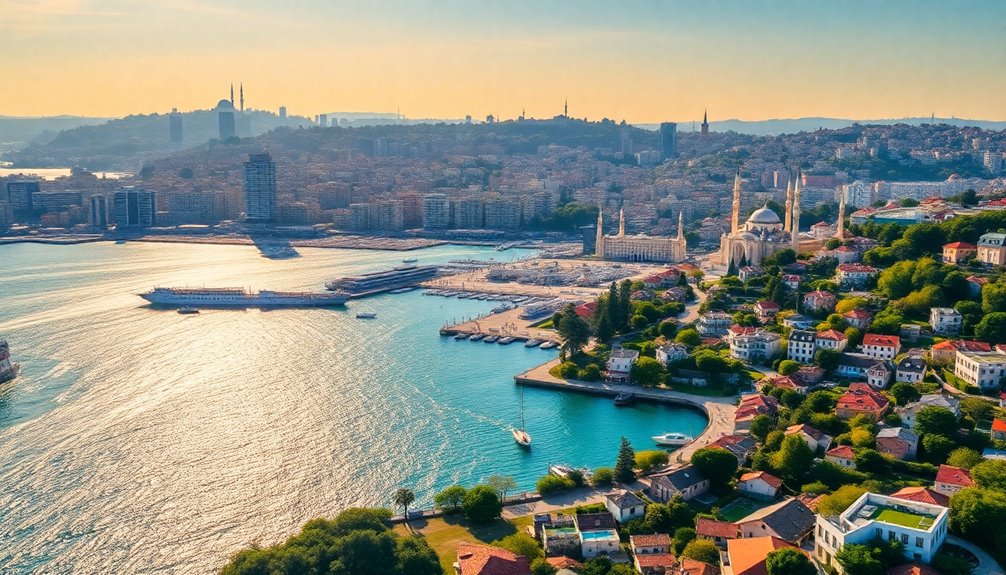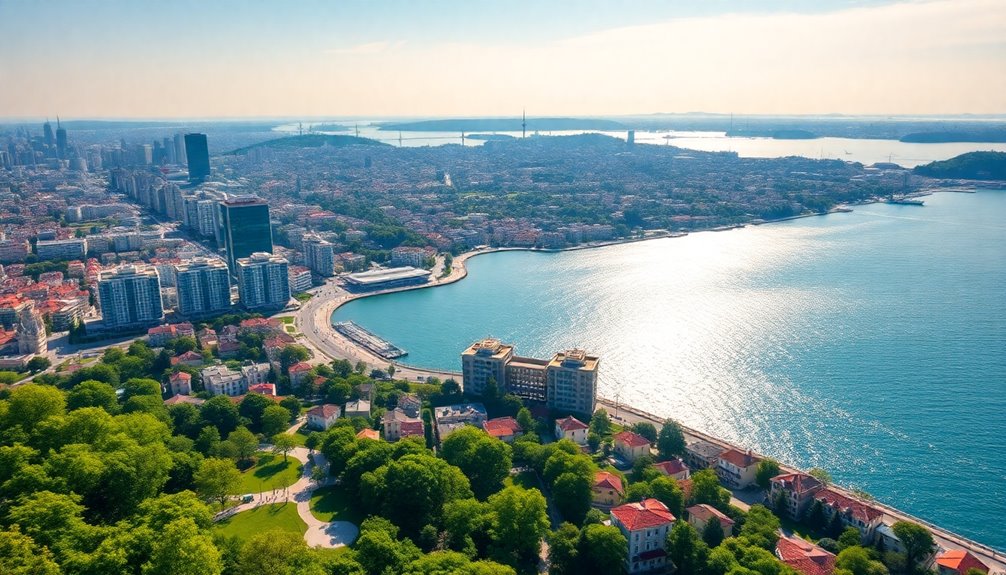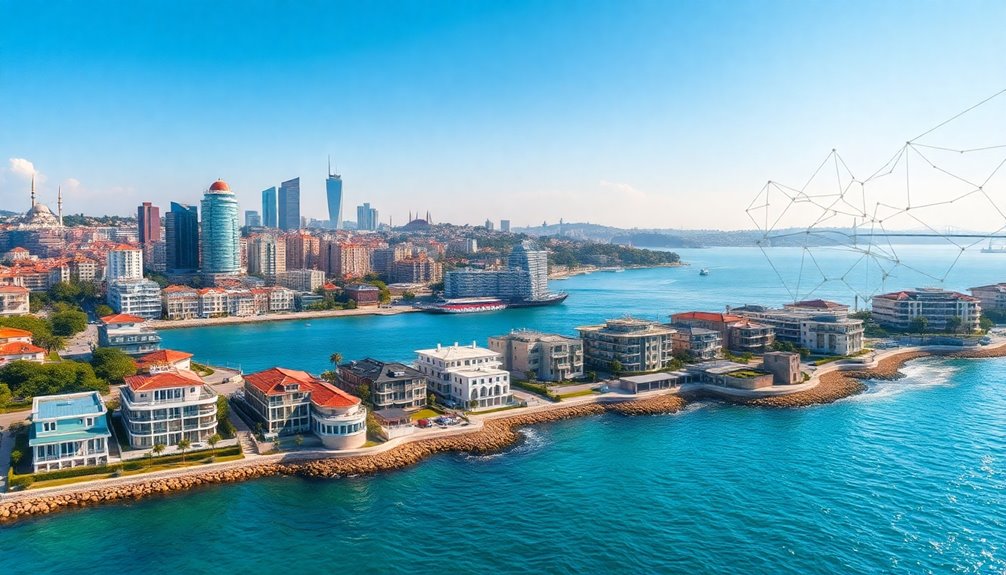Turkey's real estate market offers exciting investment opportunities, particularly in bustling Istanbul and along its stunning coastline. In Istanbul, neighborhoods like Beyoglu and Kadikoy boast high demand and potential returns, with Beyoglu's stylish options and Kadikoy's mixed-use projects leading the way. On the coast, cities like Izmir, Antalya, and Bodrum present profitable options, from relaxed sea-view living to luxury rentals. With current trends showing a strong market rebound, and favorable legal conditions for foreign investors, now's a great time to explore your options. Discover more about traversing this dynamic landscape and maximizing your investment potential.
Key Takeaways
- Istanbul's Beyoglu and Kadikoy neighborhoods offer high potential with strong demand and significant returns on stylish residential properties.
- Coastal cities like Izmir, Antalya, and Bodrum provide lucrative options, with vacation rentals and luxury villas attracting global investors.
- The thriving real estate market saw a 37% YoY increase in property sales, bolstered by high employment rates and favorable interest rates.
- Foreign investors can gain Turkish citizenship by purchasing property worth at least $400,000, with recent tax incentives enhancing the appeal of investments.
- Diversification across regions and property types, along with effective management strategies, can mitigate risks and enhance investment stability in Turkey's real estate market.
Overview of Turkey's Real Estate Market

Turkey's real estate market is currently thriving, with consistent growth attracting both domestic and foreign investors. In September 2024, residential property sales surged by 37% year-on-year, totaling nearly 141,000 properties sold. This marks the best performance since December 2022, and it's the third consecutive month of increased sales.
Significantly, new homes saw a remarkable 47% rise, while pre-owned homes increased by 33%. Additionally, the total residential properties sold in September reached just under 141,000, reflecting the robust demand in the market.
The market's affordability is improving, as the residential property price index has fallen by 15% when adjusted for inflation. Turkey's expanding economy and urbanization are fueling demand for both residential and commercial real estate.
Low interest rates and stable economic growth make it an attractive destination for investors. Additionally, the depreciation of the Turkish lira provides foreign buyers with more affordable investment opportunities.
Infrastructure development, including transportation networks, has further enhanced the investment climate. The government's Citizenship by Investment program has also drawn attention from international buyers.
With these favorable conditions, Turkey's real estate sector is projected to reach a value of US$15.41 trillion in 2024, solidifying its position as a key player in the global market.
Investment Hotspots in Istanbul

When exploring investment hotspots in Istanbul, you can't overlook Beyoglu, where emerging developments are transforming the landscape with stylish residential options. Kadikoy is another area gaining traction, thanks to its mixed-use projects that blend commercial and residential spaces seamlessly. Both neighborhoods offer exciting opportunities for savvy investors like you. Additionally, Sisli's luxury residences provide a robust real estate market that further enhances the investment landscape in the city.
Beyoglu's Emerging Developments
Emerging as a dynamic investment hotspot, Beyoglu offers unparalleled opportunities for both local and international investors. Located on the European side of Istanbul, this vibrant area boasts excellent infrastructure, including direct buses from the airport and access via bus, subway, tram, or funicular. Beyoglu attracts increasing interest from buyers and investors annually, leading to a competitive real estate market that further enhances its appeal.
Taksim Square serves as a central hub, while Istiklal Street attracts shoppers with its array of stores, cafes, and a modern art museum. The area's vibrational energy is also enhanced by the importance of maintaining high vibrational energy during workouts, which contributes to an overall lively atmosphere.
The real estate market in Beyoglu is booming, with apartment prices skyrocketing by 329.5% in September 2022 compared to the previous year. Currently, the price stands at approximately 1,527 € per square meter.
Experts believe you can recover initial costs in as little as ten years, making this a lucrative venture. The demand for both residential and commercial properties further enhances investment potential.
Culturally rich, Beyoglu features trendy dining options, art galleries, and historic landmarks, attracting both locals and tourists.
With ongoing development projects and a growing infrastructure, Beyoglu's allure only strengthens. If you're looking to invest, consider seeking guidance from local professionals to navigate this exciting market and maximize your returns.
Kadikoy's Mixed-Use Projects
Kadikoy stands out as a prime investment hotspot in Istanbul, particularly with its impressive mixed-use projects that blend residential and commercial spaces.
You'll find developments like Park Residence Cadde, featuring four 44-storey blocks with 341 luxurious residences near the prestigious Bagdat Avenue. Mesa Koz Kadikoy offers diverse apartment options along with commercial units, indoor and outdoor pools, and a fitness center—perfect for modern urban living.
The Yenitepe Kadikoy project boasts 1,100 apartments in a 21-storey building, earning a LEED Gold Certificate for sustainability. This project includes amenities like sports fields, children's playgrounds, and dedicated cycle paths, catering to families and active lifestyles. Additionally, many of these projects emphasize community living, enhancing the overall residential experience.
Kadikoy's central location provides excellent accessibility to public transport, including metro, Marmaray, and ferry services, making it an attractive option for residents and investors alike.
High demand around Bagdat Street keeps property values ranging from $1,800 to $7,000 per square meter. With ongoing development, you can expect potential capital appreciation and rental income, despite slightly weaker demand compared to the European side.
Kadikoy is definitely worth considering for your next investment opportunity.
Coastal Real Estate Opportunities

Coastal real estate in Turkey offers a golden opportunity for investors looking to capitalize on stunning seaside locations. Cities like Izmir, Antalya, and Bodrum present ideal options for those seeking vacation rentals or second homes.
Izmir, known as the "Pearl of the Aegean," boasts a relaxed lifestyle and beautiful sea-view properties. Antalya, the tourism capital, draws millions of visitors yearly, making areas like Lara and Konyaaltı prime for lucrative vacation rentals. Additionally, Turkey's tourism capital status significantly boosts property demand in coastal regions.
Bodrum, often compared to Saint-Tropez, features luxurious villas and stunning marina views, particularly in neighborhoods like Yalıkavak and Türkbükü. Fethiye, with its breathtaking beaches like Ölüdeniz, offers high rental potential for short-term holiday rentals, attracting a steady stream of European and Middle Eastern buyers.
The high demand for coastal properties in Turkey guarantees attractive rental yields, especially during peak tourist seasons. As urbanization and infrastructure improvements continue, the value of these properties is expected to rise.
Investing in coastal real estate not only provides a beautiful getaway but also an opportunity for strong returns in a vibrant market. Don’t miss out on these promising investments along Turkey’s stunning coastline! And if you’re looking for investment opportunities beyond Turkey, consider the property trends in Oman. The country’s coastal real estate market is also experiencing growth, with a booming tourism industry driving demand for waterfront properties. With its stunning beaches and warm climate, investing in coastal real estate in Oman could be a wise decision for both short-term vacation rentals and long-term appreciation. Don’t overlook the potential of coastal real estate in both Turkey and Oman when looking for lucrative investments.
Economic Factors Influencing Investments

Understanding the economic landscape in Turkey is important for anyone considering real estate investments. The country's GDP growth, fueled by the real estate sector, showcases the potential returns on property sales and rentals. Additionally, the real estate sector contributes approximately 8% to Turkey's GDP, highlighting its significance in driving overall economic development.
Keep an eye on inflation rates, as they directly affect property demand and pricing, especially in bustling cities like Istanbul. High employment rates also play a significant role, as they enhance consumer spending and foster a robust demand for real estate.
Interest rates matter too. With current rates around 1.20% and potential reductions to 0.75%-0.85%, lower rates can spur real estate sales and attract more investors. Economic stability and promising growth prospects are essential considerations when making investment decisions.
Government initiatives, such as urban renewal projects and infrastructure developments, further enhance the appeal of Turkish real estate. These projects not only drive property value appreciation but also create new investment opportunities.
Additionally, demographic trends and migration patterns shape the market landscape, making it important for you to stay informed about emerging housing demands. By understanding these economic factors, you can make well-informed investment choices in Turkey's dynamic real estate market.
Legal Considerations for Investors

Maneuvering the legal landscape of real estate investment in Turkey is crucial for success. As a foreign buyer, you'll need to verify that your nationality is from a country approved by the Council of Ministers. Remember, you can't acquire more than 30 hectares nationwide or 10% of a district's urban area. Additionally, properties in military or security zones are off-limits.
To complete your purchase, you'll submit a registration request to the Real Estate Registry Office, along with necessary documents like a translated passport and valuation report. Contracts must be finalized at official consulting offices in Turkey, and you'll need to obtain a tax number. It's important to note that national interests may impose additional restrictions on property acquisitions.
When it comes to taxes, be prepared for an 18% value-added tax on properties, a 0.2% annual property tax, and a one-time 4% transfer tax. The good news? Registration fees were recently reduced by 50%, and foreign investors now enjoy a 10-year exemption from real estate taxes.
If you're looking for citizenship, buying property worth at least $400,000 can make you eligible, but you must hold onto it for three years. Understanding these legal considerations is essential for a smooth investment journey.
Strategies for Risk Management

Maneuvering the complexities of real estate investment in Turkey requires a solid risk management strategy. Start by evaluating market conditions—Turkey's real estate sector is rebounding, yet inflation influences property values. With a 37% rise in residential sales year-on-year, it's essential to keep an eye on regional variations, especially in major cities like Istanbul and Ankara. Additionally, investing through real estate investment funds can provide a layer of diversification and reduce risk exposure. Understanding the tax implications of your investment can also enhance your risk management approach.
To reduce risk, consider diversifying your portfolio across different property types and locations. Long-term buy-and-hold strategies can provide stable returns, while short-term rentals, like Airbnb, might yield immediate income but come with management challenges.
Utilize the regulatory framework to your advantage; real estate funds are strictly regulated, lowering risk exposure. Stay prepared for economic fluctuations and potential changes in the legal landscape. Establish contingency plans for property management to guarantee steady rental income.
Additionally, having exit strategies in place—like selling or refinancing—can safeguard your investments. Consulting experienced real estate agents can also help navigate these complexities, keeping your investments secure while optimizing returns.
Frequently Asked Questions
What Are the Residency Requirements for Foreign Investors in Turkey?
To obtain residency in Turkey, you've got several options.
If you invest at least $200,000 in real estate, you can secure a residency permit.
Alternatively, you could apply for short-term or long-term permits depending on your stay duration. Work and student permits are also available.
Be sure you have a health insurance policy, as it's a key requirement for any application.
Always check the latest regulations to stay updated!
How Do Currency Fluctuations Affect Real Estate Investments in Turkey?
Think of currency fluctuations as the tide; they can either lift your investment boat or leave it stranded.
When the Turkish Lira dips, you find properties more affordable compared to other markets, making it an enticing opportunity.
However, keep in mind that local buyers may struggle as construction costs rise.
What Financing Options Are Available for Foreign Investors in Turkish Real Estate?
As a foreign investor in Turkish real estate, you've got several financing options.
You can secure a mortgage from Turkish banks, typically covering 50-70% of the property's value.
Alternatively, consider a cash purchase for immediate ownership, or explore alternative financing like developer installment plans.
If you prefer, you might also look into international financing from banks in your home country, keeping an eye on interest rates and fees.
Are There Specific Tax Obligations for Foreign Property Owners in Turkey?
Yes, as a foreign property owner in Turkey, you've specific tax obligations.
You'll need to pay a title deed fee of 4% and potentially VAT, which varies by property type.
Annual property taxes apply, too, typically around 0.2% for residential properties in big cities.
If you earn rental income, expect to pay income tax ranging from 15% to 40%.
Familiarize yourself with these obligations to guarantee compliance and avoid surprises.
How Can I Find Reputable Real Estate Agents in Istanbul?
To find reputable real estate agents in Istanbul, start by researching online reviews and testimonials from past clients.
Check platforms like Google Reviews or expatriate forums for feedback on agents' reliability. Ask friends or family for recommendations if they've worked with agents in the area.
Ascertain the agents have local experience, proper licenses, and certifications.
Meeting potential agents in person can also help you gauge their communication skills and market knowledge.
Conclusion
Turkey's real estate market is a goldmine waiting for savvy investors like you. From the bustling streets of Istanbul to the serene coastal towns, there's a wealth of opportunities to explore. By understanding the economic landscape and steering through legal considerations, you can turn potential risks into stepping stones for success. So, immerse yourself in this vibrant market—it's a treasure chest that could reveal your financial future, just waiting for you to find the key!









